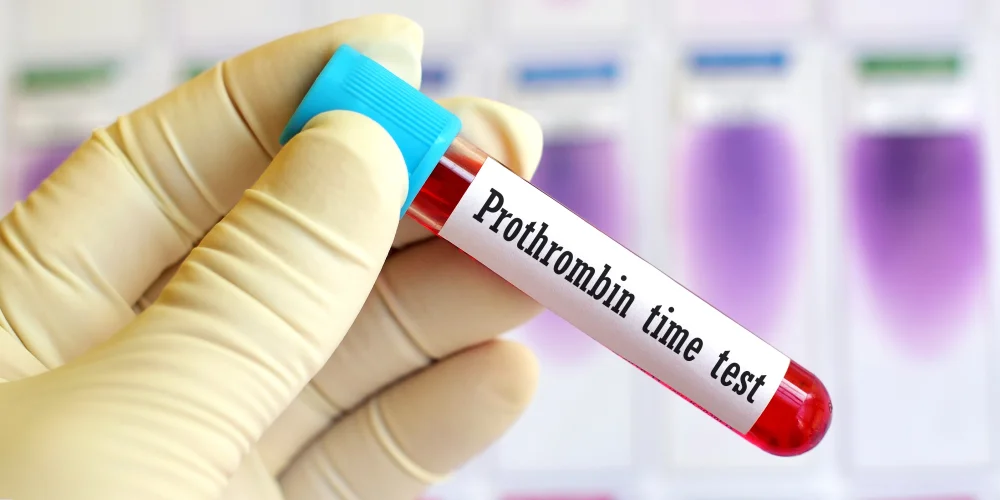Prothrombin Time Test
Assessing blood clotting for optimal health.
Prothrombin Time (PT) Tests are an indispensable diagnostic tool used to gauge how quickly blood clots. This test evaluates liver clotting factors essential to blood clotting processes, helping diagnose bleeding disorders, monitor anticoagulant therapy patients and evaluate liver health. Understanding blood clotting efficiency is crucial in effectively managing health conditions and planning treatment plans.

When is a PT Test Prescribed?
The PT Test is commonly recommended when there are symptoms of abnormal bleeding or clotting, such as unexplained bruising, frequent nosebleeds or prolonged bleeding from cuts. Patients taking anticoagulant medication like warfarin must also use this test to ensure their dosage falls within a therapeutic range; additionally it’s used to evaluate liver function as well as diagnose conditions like vitamin K deficiency or disseminated intravascular coagulation (DIC). Physicians may recommend it in order to monitor effectiveness of blood-thinning treatments and identify potential bleeding risks before surgical procedures.
Preparation for the PT Test
No special preparation is necessary for the PT Test; patients can consume their usual meals and beverages prior to taking the exam. However, it is crucial to inform healthcare providers of any medications or supplements taken prior to testing, particularly anticoagulants as these could alter the test results and require adjustments by your healthcare provider. Being open about your medication intake ensures accurate test results as well as appropriate medical advice from healthcare providers.
Parameters Considered During PT Test
The PT Test measures the time it takes for blood to clot by assessing various clotting factors and their functionality. A key parameter considered is prothrombin time – this measures how quickly blood clots after adding tissue factor into it – often expressed as seconds and often compared against a normal range to determine any abnormalities and effectively diagnose and manage clotting disorders effectively. Understanding these parameters is vital to understanding potential health concerns related to blood clotting.
Time Required for PT Test Report
The PT Test is an efficient procedure, typically taking only minutes to collect a blood sample and send it off for analysis in a laboratory. Results typically become available between four hours and 24 hours later depending on lab workload – this rapid turnaround allows timely adjustments to anticoagulant therapy or further diagnostic testing as necessary; fast results ensure fast decisions regarding treatment plans and effective care.
PT Test Price
Prothrombin Time (PT) Test Prices at Rs450 Our Prothrombin Time Test provides essential information about your blood clotting ability, providing essential support in diagnosing and managing various conditions. Providing this cost-effective option ensures accessibility for all patients allowing timely medical intervention when necessary.
Book an Appointment for PT Test
Booking an PT Test appointment at Chirayu SuperSpeciality Hospital is easy and hassle-free, whether online through our website or contacting our team. Our friendly, dedicated staff strive to offer prompt, professional service that fits into your healthcare needs quickly and professionally; their commitment is further demonstrated through an effortless booking process that demonstrates their dedication to patient care and accessibility.
What Our Patients Say
Hear from our valued patients about their experiences at Chirayu Super Speciality Hospital and how our care has made a positive impact on their health and well-being.


Very satisfied with the prompt and professional service for my PT test.


I trust Chirayu SuperSpeciality Hospital for all my lab tests. Great experience with the PT test.


Affordable and reliable PT test services. Got my results within a few hours!


The staff was very professional and made the test process comfortable and easy.


Efficient service and quick results. Highly recommend Chirayu SuperSpeciality Hospital for PT tests.
Frequently Asked Questions
Here, we provide answers to some of the most commonly asked questions to help you better understand our services, policies, and facilities. If you have any additional questions, please do not hesitate to contact us.
The PT Test measures the time it takes for blood to clot, helping diagnose bleeding disorders and monitor anticoagulant therapy.
No, fasting is not required. However, inform your doctor about any medications you are taking.
Results are typically available within a few hours to 24 hours.
It ensures that the dosage of anticoagulant medication is within the therapeutic range to prevent bleeding or clotting complications.
Yes, it can help evaluate liver function and detect liver-related clotting factor deficiencies.